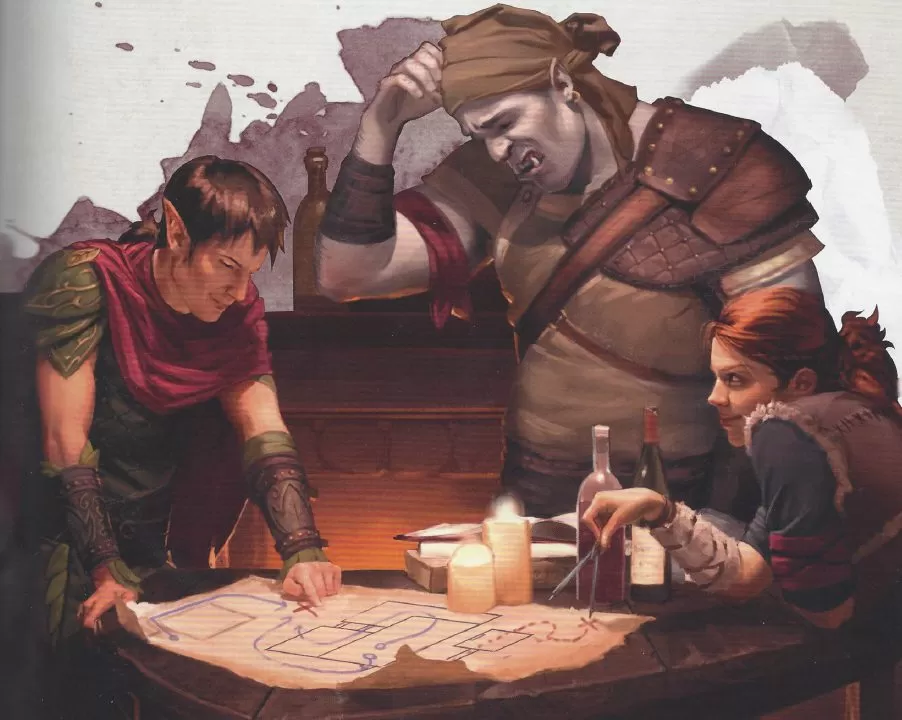
So your players have finished running through the Lost Mine of Phandelver, or the Dragon of Icespire peak, but your players want to keep the adventure going. Fortunately, with a geopolitical analysis of the region around Phandalin, you'll discover there is no shortage of possible quest ideas you can flesh out and throw at your players.
The town of Phandalin is nestled into the foothills north of the Sword Mountains, and therefore has access to the gold, platinum and cold iron veins found easily in the mountains themselves. Unfortunately, however, there is no large river system flowing by the area, so ore shipments can't be ferried downstream, and any agriculture done in the region likely can't produce enough caloric output beyond subsistence farming. Therefore, in order to keep up with the caloric demands of a mining population, food will need to be imported from elsewhere by way of overland merchant caravan, a risky and expensive endeavor.
Looking north of Phandalin, Neverwinter Wood dominates the terrain, and holds pockets of ruined towns and fortifications, like Thundertree lumber camp and Cragmaw Castle ruins. Additionally, nearby population centers include another mining town, named Leilon, a subsistence farming village called Conyberry, and the huge metropolis of Neverwinter, which sits at the mouth of it's like-named river.
Phandalin's economy, being recently invigorated with an influx of cash, thanks to speculative mining interests in Neverwinter, is still quite a ways into the frontier. Therefore, a spur road connecting Phandalin to Triboar Trail is likely unpaved and very rugged. These poor road conditions makes exporting mineral ore back to Neverwinter extremely difficult and expensive, as well as an easy target for brigands. Additionally, the expansive grasslands north of Phandalin, which Triboar Trail traverses, makes these vulnerable caravans even more exposed.
Worse still, the Neverwinter Wood offers sufficient fortification and shelter for small raiding groups to predate these roads, while also staying safe from any meaningful patrols who might go looking for them. Interestingly, the mine's investors, hailing from Neverwinter, likely take much greater offense to any raiding than would be typical of other investors from any other town on the Sword Coast. This large city has a culture of extreme efficiency and industriousness, as made evident by the regional expletive, "By the clocks of Neverwinter!"
This industrious culture is likely what has caused the city to be such a powerhouse of technological and magical development which enables their investment in Phandelver's mine operation to start with. Similar real-world industrious cultures exist in Enlightenment-rooted protestant communities as well, hailing from England, the Rust Belt of North America, as well as Northern Germany, or former Prussia.
With that in mind, Compare these organized, industrious, and methodical cultures to the people who are likely to move away from the big city and into Phandalin to work the mines. You'll find these people are happy to get away from all of Neverwinter's rules and regulations. These people value how much their own effort impacts their lives directly. This kind of political and social tension, between the orderly and authoritative demands of a large, distant city's investors, and the more autonomous and self-reliant cultures of these frontier mining camps, were seen all over the American West.
A brief scene from the 2004 HBO Western, Deadwood, best illustrates this kind of cultural tension. In this scene, Al Swearingen, a cultural leader of the Deadwood Camp, mocks the notion that new telegraph lines will lead to "progress." When questioned by his lackeys about the difference between a telegraph and regular postage, other than speed of message transmission, Al blasts into an emotional and convincing tirade about how "messages from invisible sources" only bring bad news from nosy politicians and businessmen.
Now imagine if Al were in Phandalin, and people were constructing a teleportation circle instead of a telegraph line. At any rate, thoroughly convinced they don't need a direct line to the east coast, his lackeys offer to burn down poles after nightfall. Long term political and cultural tensions between Phandalin miners and Neverwinter investors aren't the only issue, however. The nearby town of Lielon is also an established mining powerhouse and pulls ore from the same mountain system as Phandalin.
It follows then, that as prospectors move further into the Sword Mountains from both of these communities, contested mining claims are likely to become more frequent. While these two communities might be able to settle smaller disagreements on their own, larger or more complex disagreements will likely need to be settled by bureaucrats in Neverwinter.
This reality is likely not very popular with the people of Phandalin, as they know Neverwinter can easily leverage these kinds of disagreements to their own benefit. Paved roads and patrols from Neverwinter might make ore and food shipments to and from Phandalin more secure, but it also puts Neverwinter businessmen and their lackeys smack in the center of town.
With our assessment of Phandalin's status quo complete, we can identify some strategic imperatives the people of Phandalin must manage if they want to remain a successful and healthy population. Firstly, figuring out a way to ensure the roadway safety from Triboar Trail to the well patrolled High Road is an absolute must. The entire purpose of Phandalin's economy is wound up in its mining operation, and if the fruits of that labor can't be delivered back to Neverwinter, then all the prospecting, mining, and smelting isn't worth the effort.
Additionally, exporting ore isn't the only reason for safe roads. Phandalin likely needs to import most of its food to keep the population healthy enough for mining. While some food can likely be grown near Phandalin, there won't be enough to support the non-farming population, due to a lack of rivers for irrigation. Imported grain will likely have to come from Neverwinter or Triboar, a distant trading town in the east.
Further, natural resource management between Phandalin and Leilon is also a likely serious point of contention, especially since both mining communities will want to involve Neverwinter as little as possible in any ongoing prospecting disputes. Involving bureaucrats from Neverwinter would only make sense if prospectors or mine managers believe they can settle a conflict that would tip the power balance between the two communities in their own favor.
With all that said, any one of these imperatives, or even all of them at once, can be exploited by a nefarious actor wanting to disrupt or oppress the people of Phandalin and gain control of the mines. For example, an insidious mining manager from Leilon might hire bandits to take over Cragmaw Castle and harass trade caravans going into Phandalin.
Further, now that the dragon threats of Venomfang from Thundertree, and Cryovein from Ice Spire Peak, are neutralized, Leilon agents might also attempt to strike a deal with Claugiyalimatar, also called the Old Gnawed One, a powerful green dragon that lives in the Kryptgarden Forest south of the Sword Mountains. This dragon might be just what's needed to tax and punish the people of Phandalin terribly, and in such a way that Neverwinter bureaucrats ever suspect Leilonian leadership had anything to do with it.
Further, any smaller tribes of goblinoids in Neverwinter Wood, or any remaining orcs and ogres near Wyvern Tor might also take up residence in a vacant Cragmaw castle ruins, possibly all on their own accord. Finally, Neverwinter agents themselves might illicitly instigate these raiders all on their own, paying brigands to create a problem that only Neverwinter agents can solve: a manufactured problem all to take more direct control of the mines.
Regardless, if raiders, goblins, orcs, or whatever, roost back into Cragmaw Castle, the city-slicker investors will likely exert more direct, physical authority into the region and hire private mercenaries to patrol and pave roads, and otherwise take a more hands-on approach to Phandanlin mining operations. While a show of force might secure the mines, this also might invite suspicion and investigation from the Harpers, an anti-tyranny faction with secret agents all over the Sword Coast.
In essence, just because your players may have completed the adventures in the Starter Sets doesn't mean that the people of Phandalin are without problems. History has no end game, and Phandolin's problems are just getting started.






